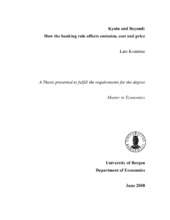Kyoto and Beyond: How the banking rule affects emission, cost and price
Master thesis
Permanent lenke
https://hdl.handle.net/1956/2965Utgivelsesdato
2008-05-20Metadata
Vis full innførselSamlinger
- Department of Economics [288]
Sammendrag
In this thesis I investigate numerically how three different scenarios of a Post-Kyoto agreement for the commitment period 2013-2017 affect the overall emission abatement, the cost of compliance and the price for emission permits in both the Kyoto (2008-2012) and the Post-Kyoto periods. The scenarios affect both periods through the banking rule; one of the compliance rules governing the emission trade mechanism in the Kyoto Protocol. In my results, banking reduces the overall cost of abatement and shifts abatement from the subsequent period to the present, when the Post-Kyoto emission targets are lower than in the present period. Due to over allocation of permits in the Kyoto period, so called hot air", it also causes a higher overall emissions, compared to a non-banking version of the same market, due to the possibility of bringing surplus permits from the Kyoto period into the next period. The numerical analysis in this thesis has been done using GAMS.
Utgiver
The University of BergenOpphavsrett
The authorCopyright the author. All rights reserved
